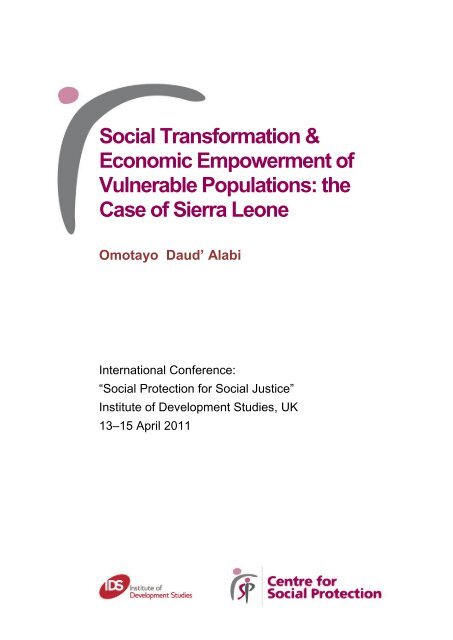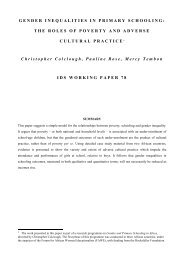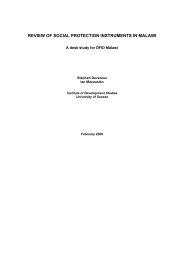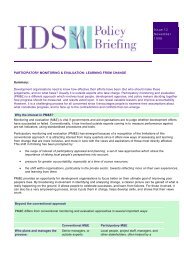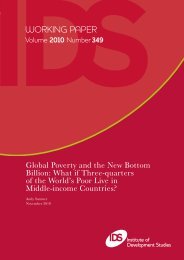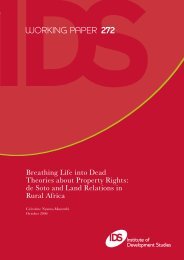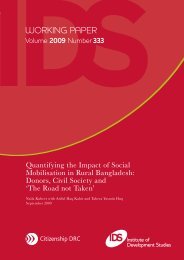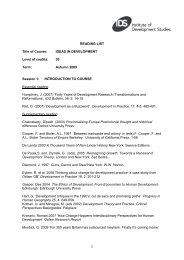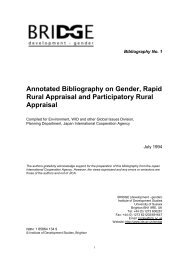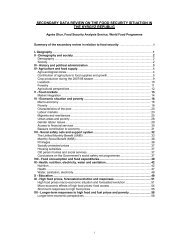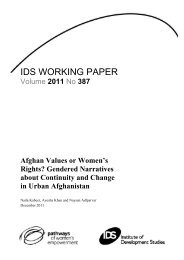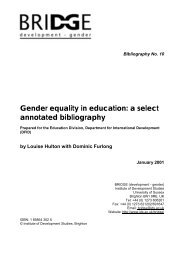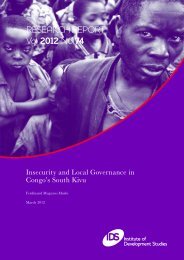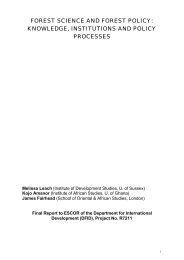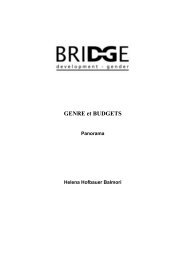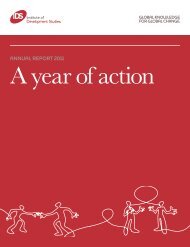the Case of Sierra Leone - Institute of Development Studies
the Case of Sierra Leone - Institute of Development Studies
the Case of Sierra Leone - Institute of Development Studies
Create successful ePaper yourself
Turn your PDF publications into a flip-book with our unique Google optimized e-Paper software.
Social Transformation &<br />
Economic Empowerment <strong>of</strong><br />
Vulnerable Populations: <strong>the</strong><br />
<strong>Case</strong> <strong>of</strong> <strong>Sierra</strong> <strong>Leone</strong><br />
Omotayo Daud’ Alabi<br />
International Conference:<br />
“Social Protection for Social Justice”<br />
<strong>Institute</strong> <strong>of</strong> <strong>Development</strong> <strong>Studies</strong>, UK<br />
13–15 April 2011<br />
1
Social Transformation & Economic Empowerment <strong>of</strong> Vulnerable Populations:<br />
The <strong>Case</strong> <strong>of</strong> <strong>Sierra</strong> <strong>Leone</strong><br />
Omotayo Daud’ Alabi<br />
Abstract<br />
70% percent <strong>of</strong> <strong>Sierra</strong> <strong>Leone</strong>ans are poor and about 50% are critically poor. The country is nearly<br />
bottom <strong>of</strong> <strong>the</strong> Human <strong>Development</strong> Index (180/182 - UNDP 2009); <strong>the</strong> Government <strong>of</strong> <strong>Sierra</strong> <strong>Leone</strong>‟s<br />
low internal revenue generation is outweighed by demand for services. Low on almost all human<br />
development parameters, allocation <strong>of</strong> available resources to priority development sectors (health, food,<br />
education and infrastructural development) means that <strong>the</strong> need <strong>of</strong> <strong>the</strong> extreme poor for social<br />
protection hasn‟t been adequately addressed and <strong>the</strong> government‟s mandate to respond to <strong>the</strong> most<br />
pressing needs <strong>of</strong> <strong>the</strong> chronically poor are not fulfilled. This paper argues that protecting basic needs<br />
and wellbeing <strong>of</strong> <strong>the</strong> extreme poor is a human right and <strong>the</strong> collective responsibility <strong>of</strong> <strong>the</strong> state and<br />
citizens. In <strong>the</strong> paper we underscore <strong>the</strong> fact that, integral to <strong>the</strong> success <strong>of</strong> any medium to longer term<br />
social protection initiative is political understanding <strong>of</strong> <strong>the</strong> dimensions <strong>of</strong> poverty, political commitment to<br />
poverty alleviation and support mechanisms in place to drive <strong>the</strong>se processes.<br />
An overarching policy framework supported by Concern Worldwide and DFID is in its incipient stage in<br />
<strong>Sierra</strong> <strong>Leone</strong>. This is a precursor requirement and an important step towards sustainable development<br />
and implementation <strong>of</strong> a nationally owned social protection system. Using a schematic framework this<br />
paper demonstrates <strong>the</strong> potential <strong>of</strong> social assistance for supporting <strong>the</strong> most vulnerable through <strong>the</strong><br />
recovery phase in fragile states such as <strong>Sierra</strong> <strong>Leone</strong>. We support our argument by detailing ongoing<br />
efforts <strong>of</strong> <strong>the</strong> GoSL to demonstrate that governments in fragile states, if committed, have capacity to<br />
transform lives <strong>of</strong> citizens. The paper provides overview <strong>of</strong> <strong>the</strong> disparate social assistance initiatives<br />
currently supported by GoSL including free health care for pregnant women and under fives, pilot cash<br />
transfers to <strong>the</strong> elderly, free primary education for girls which, though still relatively small and<br />
fragmented, are contributing significantly to <strong>the</strong> wellbeing <strong>of</strong> vulnerable people. It discusses <strong>the</strong> issues<br />
which limit effectiveness <strong>of</strong> <strong>the</strong>se schemes - fraught by a lack <strong>of</strong> coordination and rivalry within<br />
government to pitch social protection control within <strong>the</strong>ir Ministry or Agency. The absence <strong>of</strong> an<br />
overarching, systematic national social protection programme will ultimately impact on <strong>the</strong> progress in<br />
and sustainability <strong>of</strong> <strong>the</strong> ongoing poverty alleviation programmes.<br />
The paper draws on examples from Concern Worldwide‟s work in rural communities in <strong>Sierra</strong> <strong>Leone</strong> in<br />
<strong>the</strong> last six years following <strong>the</strong> civil conflicts that engulfed <strong>the</strong> country from 1991 to2002, showing how<br />
social protection elements have been mainstreamed across <strong>the</strong> three main intervention areas <strong>of</strong><br />
Education, Health and Food Income and Markets (FIM). Programmes have promoted and built upon<br />
traditional coping strategies during <strong>the</strong> period whilst <strong>the</strong> policy formulation process for social protection<br />
at national level was supported. These programmes have not only built capacity and transformed lives<br />
<strong>of</strong> programme participants <strong>the</strong>y also raised local awareness <strong>of</strong> <strong>the</strong> entitlements <strong>of</strong> some <strong>of</strong> <strong>the</strong><br />
community‟s most vulnerable people including orphans, widows, elderly and disabled people and<br />
supported communities to address <strong>the</strong>se needs through innovative, community-based social protection<br />
mechanisms.<br />
1
1. Introduction<br />
The concept <strong>of</strong> “social protection” is derived from <strong>the</strong> visions <strong>of</strong> benevolent individuals, workers<br />
and politicians in Europe which led to <strong>the</strong> policies and<br />
schemes implemented over <strong>the</strong> last century known as<br />
<strong>the</strong> western “welfare state”. Key initiatives associated<br />
with this include „employment protection‟,<br />
„unemployment protection‟, „wage protection‟ and<br />
„social pensions‟. However, social protection initiatives<br />
are also implemented in <strong>the</strong> traditional African context,<br />
where support systems are usually <strong>the</strong> responsibility <strong>of</strong><br />
<strong>the</strong> community or <strong>the</strong> extended family.<br />
Even though a variety <strong>of</strong> formal social protection<br />
policies and initiatives appear to be widely adopted<br />
throughout Africa (see Box 1), <strong>the</strong> debate on <strong>the</strong><br />
African state‟s capability to implement social protection<br />
schemes is <strong>of</strong>ten limited by a pessimistic understanding<br />
<strong>of</strong> <strong>the</strong> African state‟s financial and administrative<br />
capacity. However, <strong>the</strong> transition from structural<br />
adjustment programmes to <strong>the</strong> new development<br />
agenda <strong>of</strong> reaching <strong>the</strong> 2015 Millennium <strong>Development</strong><br />
Goals (MDGs) has refocused <strong>the</strong> debate on <strong>the</strong><br />
necessity <strong>of</strong> complementary ambitious state social<br />
policies, ra<strong>the</strong>r than solely focusing on economic<br />
capabilities (World Bank, 2009). It is recognized that<br />
without <strong>the</strong> commitment <strong>of</strong> governments to promoting<br />
social and human capital development and equitable<br />
growth, development initiatives are unlikely to be<br />
sustainable. Strong and effective social protection<br />
policies are increasingly seen as necessary, if not a<br />
condition, for equitable distribution <strong>of</strong> national wealth<br />
and development benefit. Unfortunately though, social<br />
protection is <strong>of</strong>ten not a state priority in <strong>the</strong> face <strong>of</strong><br />
competing needs and interests. The MDGs‟ emphasis<br />
on <strong>the</strong> need to put in place functional policies has<br />
assisted countries in refocusing on policies.<br />
Box 1: Social Protection<br />
Initiatives in Africa<br />
In <strong>the</strong> Sou<strong>the</strong>rn parts <strong>of</strong> Africa,<br />
Namibia and South Africa rapidly<br />
expanded <strong>the</strong>ir social pension<br />
schemes following independence<br />
in <strong>the</strong> early 1990s (Hickey 2007).<br />
In East Africa, <strong>the</strong> Ethiopian<br />
Government implemented <strong>the</strong>ir<br />
Productive Safety Net Programme<br />
in 2004 (Devereux 2006: 14) In<br />
<strong>the</strong> West African region, Burkina<br />
Faso and Cape Verde adopted<br />
National Social Protection Plans<br />
in 2007 and 2006 respectively.<br />
Cape Verde has also embarked<br />
on a Social Pension Scheme.<br />
Ghana engaged in national health<br />
insurance in 2003 and finalized its<br />
National Social Protection<br />
strategy in 2007.<br />
Senegal also has one <strong>of</strong> <strong>the</strong> more<br />
ambitious social protection<br />
strategies, aimed at extending<br />
health insurance to 50% <strong>of</strong> its<br />
population.<br />
Cash transfer programmes are at<br />
<strong>the</strong> moment being tested on a<br />
pilot stage in countries such as<br />
Ghana, <strong>Sierra</strong> <strong>Leone</strong>, Kenya,<br />
Uganda, Malawi and Zambia<br />
(Anthony Hodges 2008).<br />
Based on <strong>the</strong> understanding that government buy in to<br />
this idea, and relevant national policies, are both<br />
central to <strong>the</strong> success and upscale <strong>of</strong> social protection initiatives, this paper explores how <strong>the</strong><br />
Government <strong>of</strong> <strong>Sierra</strong> <strong>Leone</strong> approaches social protection, how far it has come in implementing its<br />
initiatives and challenges faced. The discussion will focus on social protection policies and<br />
initiatives directed towards <strong>the</strong> most poor and marginalised people in <strong>Sierra</strong> <strong>Leone</strong>. In order to<br />
inform this discussion and provide empirically founded recommendations as to how <strong>the</strong>se<br />
2
initiatives can be streng<strong>the</strong>ned, lessons learned from community-driven initiatives supported by<br />
Concern will be discussed.<br />
The paper challenges an <strong>of</strong>ten heard assumption with regard to social protection in Africa that poor<br />
and under-developed countries are unable to provide an enduring social protection system which<br />
provides for <strong>the</strong> most marginalized and vulnerable people whilst undertaking rehabilitation and<br />
recovery <strong>of</strong> <strong>the</strong> economy <strong>of</strong> a failed state.<br />
This paper aims, <strong>the</strong>refore, to answer two specific research questions:<br />
- In which regard, and to what extent, has <strong>the</strong> Government <strong>of</strong> <strong>Sierra</strong> <strong>Leone</strong> shown initiative<br />
and commitment towards assisting poor and marginalized people through <strong>the</strong>ir post war<br />
policies<br />
- Which recommendations and lessons learned can be derived from community-based<br />
initiatives with regard to developing a stronger social protection framework in <strong>Sierra</strong> <strong>Leone</strong><br />
3
2. Background on <strong>Sierra</strong> <strong>Leone</strong><br />
<strong>Sierra</strong> <strong>Leone</strong> is currently considered to be one <strong>of</strong> <strong>the</strong> most peaceful countries in Africa, according<br />
to <strong>the</strong> Global Peace Index 2010. However, <strong>the</strong> brutal ten year civil war ended less than a decade<br />
ago, in 2002. Some <strong>of</strong> <strong>the</strong> dominant explanations <strong>of</strong> <strong>the</strong> root causes <strong>of</strong> <strong>the</strong> civil war are linked to<br />
pre-war lack <strong>of</strong> opportunities for and protection <strong>of</strong> youths. Many youths were abused by political<br />
elites and traditional chiefs, lacking opportunities to<br />
make a better life in terms <strong>of</strong> access to land, education<br />
and jobs. Such disgruntled youth who felt left out were Box 2:<br />
easily mobilised in <strong>the</strong> civil conflict and made to<br />
Socio-economic Indicators<br />
perpetuate <strong>the</strong> mayhem that followed (Fanthorp 2001).<br />
Social protection in <strong>Sierra</strong> <strong>Leone</strong> is, <strong>the</strong>refore, not only<br />
a question <strong>of</strong> supporting basic needs <strong>of</strong> vulnerable<br />
groups, but should also be understood as a<br />
mechanism and tool for ensuring livelihood security for<br />
marginalised people, which may help to fur<strong>the</strong>r<br />
consolidate peace and eventually mitigate <strong>the</strong><br />
chances <strong>of</strong> relapse into violence and conflict. In<br />
addition, by providing social protection, <strong>the</strong><br />
Government will be seen to be serving <strong>the</strong> needs <strong>of</strong> its<br />
population, and responding to <strong>the</strong> demands <strong>of</strong><br />
marginalised people, thus building a stronger contract<br />
between state and citizen.<br />
In less than ten years <strong>Sierra</strong> <strong>Leone</strong> has undergone a<br />
remarkable post-war transition process. In 2007 <strong>the</strong><br />
first peaceful election without <strong>the</strong> presence <strong>of</strong> UN<br />
peacekeepers was successfully held. In 2008 local<br />
council elections were also held in line with <strong>the</strong> 2004<br />
Local Government Act. This Act was established to<br />
decentralise government power and devolve functions<br />
and key responsibilities to local district councils. These<br />
initiatives are indicative <strong>of</strong> <strong>Sierra</strong> <strong>Leone</strong>‟s transition<br />
from a post-conflict rehabilitation phase to a period <strong>of</strong><br />
long term development. However, although progress<br />
has been made along political dimensions, socioeconomic<br />
indicators still show that <strong>Sierra</strong> <strong>Leone</strong> is in a<br />
severe state <strong>of</strong> poverty (See Box 2).<br />
<strong>Sierra</strong> <strong>Leone</strong> has moved from its emergency phase<br />
into a recovery stage and now embarked on <strong>the</strong> path<br />
to development. Poverty Reduction Strategy Papers,<br />
<strong>the</strong> first covering 2005-2007 and <strong>the</strong> second from<br />
2008-2012, were both entitled <strong>the</strong> “Agenda for<br />
Change”: <strong>the</strong> general consensus is that <strong>the</strong>se are solid<br />
structures on which long term development could be<br />
Despite a wealth <strong>of</strong> natural<br />
resources such as gold, diamonds,<br />
iron ore, bauxite and rutile, <strong>Sierra</strong><br />
<strong>Leone</strong> is ranked amongst <strong>the</strong> very<br />
bottom countries listed in <strong>the</strong><br />
UNDP‟s Human <strong>Development</strong><br />
Index (in 2009 <strong>Sierra</strong> <strong>Leone</strong> was<br />
ranked 180/182 and in 2010<br />
158/169).<br />
O<strong>the</strong>r key indicators reveal <strong>the</strong><br />
same devastating picture. Life<br />
expectancy at birth is 48 years (WB<br />
2009), adult literacy is 40% (WB<br />
2008), 1 in 5 children die before <strong>the</strong><br />
age <strong>of</strong> 5, and women have a 1 in 8<br />
lifetime chance <strong>of</strong> dying in child<br />
birth (UNICEF, 2009).<br />
Public spending on health and<br />
education is amongst <strong>the</strong> lowest in<br />
<strong>the</strong> world.<br />
Fur<strong>the</strong>rmore, only 47% <strong>of</strong> people<br />
have access to improved water<br />
sources (GoSL, 2010) and 70%<br />
live under <strong>the</strong> national poverty line<br />
<strong>of</strong> Le 2,111(ca. 0.5 USD) per day<br />
(Statistics <strong>Sierra</strong> <strong>Leone</strong>, 2009).<br />
26% <strong>of</strong> <strong>the</strong>se are extremely poor.<br />
4
ased. This is especially evident from <strong>the</strong> successful democratic national and local elections. The<br />
decentralization process has already recorded elements <strong>of</strong> success and is widely seen as a key<br />
driver for grassroots democracy. There is a steady economic growth rate <strong>of</strong> about 4% along with<br />
single digit inflation rate (Statistics <strong>Sierra</strong> <strong>Leone</strong> Annual Economic Survey 2008, and IFC 2009).<br />
<strong>Sierra</strong> <strong>Leone</strong>‟s remarkable post-war transition process, anchored in <strong>the</strong> consolidation <strong>of</strong> democracy<br />
and peace, and supported by considerable investment in physical infrastructure development<br />
estimated at over $1bn (SLIEPA, 2009) has been presented by many observers as a unique case<br />
in Africa to understand and ga<strong>the</strong>r best practices from. This article will attempt to present a case<br />
that <strong>Sierra</strong> <strong>Leone</strong> is also making progress in this direction in terms <strong>of</strong> exploring social protection<br />
policies.<br />
3. The concept <strong>of</strong> social protection<br />
Concern understands social protection as all forms <strong>of</strong> social insurance and social security/social<br />
welfare that governments regulate, provide, or o<strong>the</strong>rwise make available to <strong>the</strong>ir citizens. These<br />
policies should be predictable and reliable sources <strong>of</strong> protection, in <strong>the</strong> form <strong>of</strong> ei<strong>the</strong>r cash<br />
transfers, in-kind transfers, or a combination <strong>of</strong> both, that help people maintain a minimum<br />
standard <strong>of</strong> living, as defined in each country (Concern, Social Protection Policy Paper, 2008). To<br />
<strong>the</strong> International Labour Organisation (ILO) “social protection means access to essential services<br />
and social transfer for <strong>the</strong> poor and vulnerable” (ILO 2010), while DFID conceptualises social<br />
protection as “public action taken in response to level <strong>of</strong> vulnerability, risk and deprivation which<br />
are seen as socially unacceptable within a given polity or society” (Conway, et.al 2000). UNICEF<br />
views social protection as a basic human right and mentions how “governments have an obligation<br />
to provide both economic and social support to <strong>the</strong> most vulnerable segments <strong>of</strong> <strong>the</strong>ir population”.<br />
Therefore, in this regard Concern‟s definition <strong>of</strong> social protection compliments <strong>the</strong> widely held<br />
views <strong>of</strong> o<strong>the</strong>r development actors.<br />
In <strong>Sierra</strong> <strong>Leone</strong>, in <strong>the</strong> absence <strong>of</strong> a country level social protection policy, Concern proposes a<br />
broad conceptual framework based on our understanding <strong>of</strong> <strong>the</strong> different initiatives currently under<br />
development or being implemented. The framework is guided by <strong>the</strong> various global and regional<br />
conventions and agreements that <strong>the</strong> Government <strong>of</strong> <strong>Sierra</strong> <strong>Leone</strong> is party to, and attempts to<br />
capture <strong>the</strong> level and nature <strong>of</strong> <strong>the</strong> varied operational policies in place which act as <strong>the</strong> guidelines<br />
for <strong>the</strong> Government. By so doing it aims to inform development <strong>of</strong> an eventual comprehensive<br />
social protection policy.<br />
The framework captures <strong>the</strong> driving forces and gives suggestions <strong>of</strong> outcomes running through<br />
from <strong>the</strong> process up to <strong>the</strong> point where improved livelihoods options and improved standards <strong>of</strong><br />
living are reached. It shows that <strong>the</strong> main driver <strong>of</strong> any social protection intervention should be <strong>the</strong><br />
desire to unshackle those most economical and socially at risk, for whom it is most difficult to<br />
recover from shocks and stresses. The national policies and initiatives currently implemented,<br />
such as Free Health Care and cash transfers, all implemented through various ministries, are<br />
identified in <strong>the</strong> framework as practical initiatives. The framework <strong>the</strong>n emphasises <strong>the</strong> need for a<br />
steady and continuous reflection on factors that may exert pressure, shocks and stresses. The<br />
processes required to know and understand <strong>the</strong> sources, be it at strategy or activity level, will<br />
constantly need to be monitored and reviewed.<br />
5
DRIVING<br />
FORCES:<br />
Existence <strong>of</strong><br />
endemic<br />
poverty,<br />
marginalized<br />
+ vulnerable<br />
groups<br />
Global and<br />
regional<br />
factors:<br />
- Donor<br />
policy and<br />
practice<br />
- Global<br />
social trends<br />
- Policy<br />
trends<br />
Social<br />
factors:<br />
- Public<br />
attitudes<br />
- Lobbying<br />
National<br />
policies:<br />
- Free Health<br />
care<br />
- Education<br />
- SCP<br />
- PRSP<br />
- Local<br />
Government Act<br />
NGO / CBO:<br />
Country<br />
Strategy<br />
Plan<br />
-<br />
-<br />
Risks and vulnerability<br />
STRATEGIES<br />
ACTIVITIES<br />
National level:<br />
Documentation:<br />
- - Pilot cash transfer,<br />
- Registry<br />
- - National school feeding,<br />
- Levels <strong>of</strong><br />
programme,<br />
embarkment<br />
- - Health fee waivers,<br />
- Baseline<br />
- - Smallholder<br />
-Technology<br />
commercialization<br />
programme,<br />
Targeting:<br />
-Orphans,<br />
- - Decentralization<br />
-Widows,<br />
-Handicapped,<br />
Community level:<br />
-Young children,<br />
- Aged,<br />
- - Distribution <strong>of</strong> seeds,<br />
- Unemployed,<br />
- - Solidarity groups,<br />
- Chronically ill<br />
- - Access to health and<br />
education<br />
- - Livestock,<br />
- - DRR<br />
Review + M&E<br />
Review + M&E<br />
Review + M&E<br />
IMPACTS<br />
Political impact e.g.<br />
regime stability, dividend<br />
<strong>of</strong> democracy, meeting<br />
MDG goals<br />
DISEMBARKMENT<br />
improved livelihood<br />
options as a result<br />
<strong>of</strong> social protection<br />
initiatives<br />
Civil Society impact<br />
e.g. broader<br />
participation<br />
-<br />
Acknowledging that social protection is a relatively new concept in <strong>Sierra</strong> <strong>Leone</strong>, <strong>the</strong> Government<br />
and o<strong>the</strong>r stakeholders, prompted by <strong>the</strong> “Livingstone process” 1 organised by <strong>the</strong> African Union,<br />
are all developing <strong>the</strong>ir own understanding <strong>of</strong> it. Civil society organisations such as Concern are<br />
using a combination <strong>of</strong> <strong>the</strong>ir involvement in policy formulation at national level, and experiences<br />
and activities implemented in <strong>the</strong> field, to inform <strong>the</strong>ir approach. The broad framework above<br />
reflects Concern‟s understanding <strong>of</strong> social protection in <strong>Sierra</strong> <strong>Leone</strong> and is presented as a tool to<br />
inform our engagement with <strong>the</strong> Government, alongside o<strong>the</strong>r stakeholders, through membership<br />
<strong>of</strong> <strong>the</strong> National Committee on Social Protection, to support development and advocate for adoption<br />
<strong>of</strong> a national level framework, which will guide policy formulation and implementation.<br />
The two following sections provide fur<strong>the</strong>r information on a few national and community level<br />
initiatives represented in <strong>the</strong> framework. As most <strong>of</strong> <strong>the</strong>se initiatives are still in <strong>the</strong>ir infancy,<br />
impacts may not be visible at <strong>the</strong> moment; it is, however, anticipated in <strong>the</strong> framework that <strong>the</strong><br />
collective impact <strong>of</strong> <strong>the</strong> individual initiatives will lead to impacts in political, civil society and<br />
household spheres.<br />
1 The Livingstone Process refers to <strong>the</strong> commitment made by heads <strong>of</strong> African governments in 2006 and 2008 to<br />
fur<strong>the</strong>r basic social protection in support <strong>of</strong> <strong>the</strong>ir most disadvantaged citizens, with special emphasis placed on<br />
implementing cash transfer schemes, including social pensions and child grants.<br />
6
3. National Level Initiatives<br />
<strong>Sierra</strong> <strong>Leone</strong> still faced enormous challenges. For instance <strong>the</strong>re is limited internal revenue<br />
generated by <strong>the</strong> Government. Nearly half <strong>of</strong> <strong>the</strong> current revenue base is derived from bilateral<br />
donor support (WB 2009). In spite <strong>of</strong> this, <strong>the</strong> Government <strong>of</strong> <strong>Sierra</strong> <strong>Leone</strong> (GoSL) has expressed<br />
commitment to ensuring <strong>the</strong> welfare <strong>of</strong> poor and vulnerable populations by embarking on<br />
developing various social protection and social assistance initiatives. Among o<strong>the</strong>rs, <strong>the</strong>se include:<br />
<br />
<br />
<br />
<br />
launching <strong>of</strong> a pilot project for conditional cash transfers to vulnerable and marginalised<br />
people across <strong>the</strong> country;<br />
launching <strong>of</strong> free health care for children under five, pregnant women and lactating mo<strong>the</strong>rs<br />
to reduce infant and maternal mortality;<br />
introduction <strong>of</strong> a Smallholder Commercialisation Programme (SCP) that incorporates a<br />
safety net component for small scale farmers; and<br />
support to free primary education, waiving fees for girls as part <strong>of</strong> <strong>the</strong> commitment to<br />
Universal Education for All in 2004.<br />
3.1. Free Health Care<br />
Free health care was launched by <strong>the</strong> GoSL on 27 th April 2010. It is intended to contribute to<br />
overcoming and addressing <strong>the</strong> barriers to health care faced by poor, marginalised and vulnerable<br />
people. <strong>Studies</strong> by Médecins Sans Frontières and Save <strong>the</strong> Children (MSF, 2005) and Concern<br />
have shown that one <strong>of</strong> <strong>the</strong> primary barriers for extremely poor people to access health care was<br />
user fees, which were being charged for both consultation and for obtaining medication. O<strong>the</strong>r<br />
reasons given were limited physical access to health-care facilities and low remuneration <strong>of</strong> health<br />
workers.<br />
This initiative built on <strong>the</strong> previous policy to provide free access to anti retro-viral <strong>the</strong>rapy (ARVs)<br />
for people living with HIV. Implementation <strong>of</strong> <strong>the</strong> free healthcare programme, 60% <strong>of</strong> funds for<br />
which are provided by <strong>the</strong> national Government, with additional support mostly from <strong>the</strong> UK and<br />
USA, is expected to benefit approximately 1.5 million people (lactating mo<strong>the</strong>rs, children under five<br />
and pregnant women as direct beneficiaries). The initiative is estimated to cost <strong>the</strong> Government <strong>of</strong><br />
<strong>Sierra</strong> <strong>Leone</strong> nearly 19 million US dollars over an initial three years. This indicates a strong<br />
demonstration <strong>of</strong> <strong>the</strong> Government‟s commitment to addressing <strong>the</strong> problem <strong>of</strong> infant and maternal<br />
mortality. Concern Worldwide, along with o<strong>the</strong>r actors, supports <strong>the</strong> Government technically and<br />
financially to actualise this ambitious plan. Salaries for health workers have been revised and<br />
increased within <strong>the</strong> free health care package. Access to health facilities is being addressed<br />
through <strong>the</strong> „rural feeder road development support‟ and „smallholder commercialisation<br />
programme‟ supported by a number <strong>of</strong> actors such as <strong>the</strong> World Bank, European Union, Concern,<br />
and <strong>the</strong> German International Cooperation (GIZ).<br />
Concern‟s Health programme aims to support <strong>the</strong> development <strong>of</strong> sustainable health care systems<br />
and practices through Government and community (civil society) mechanisms. A major component<br />
is <strong>the</strong> huge support Concern provides to <strong>the</strong> Government‟s Free Health Care initiative. This is<br />
particularly through procurement and supply <strong>of</strong> medical drugs to targeted clinics in our operational<br />
area, and technical support to effective monitoring and evaluation to ensure that drugs reach <strong>the</strong><br />
7
most remote areas. Anecdotal evidence suggests that a positive impact is already being<br />
witnessed, with clinics reporting an increase in attendance <strong>of</strong> pregnant women, new mo<strong>the</strong>rs and<br />
children under-five.<br />
32. Smallholder Commercialization Programme<br />
The Smallholder Commercialisation Programme (SCP) is an integral part <strong>of</strong> <strong>the</strong> National<br />
Sustainable Agricultural <strong>Development</strong> Programme (NSADP). The Government has made a<br />
commitment to run <strong>the</strong> NSADP for 20 years (2010-2030), with allocation from its own budget and<br />
grants from <strong>the</strong> European Union, Islamic <strong>Development</strong> fund and o<strong>the</strong>r donors; <strong>the</strong> overall<br />
estimated project cost over five years is US$403 million. Two key pillars in <strong>the</strong> SCP are social<br />
protection and safety nets for smallholding farmers. The safety net provides „food for work‟ to<br />
farmers and youths doing labour intensive essential activities such as swamp development, feeder<br />
road rehabilitation and culvert construction. The scheme intends to reach two million beneficiaries.<br />
3.3. Cash Transfer Pilot project<br />
The Government <strong>of</strong> <strong>Sierra</strong> <strong>Leone</strong> initially launched <strong>the</strong> National Social Security and Insurance<br />
Trust (NASSIT) in 2001, a contributory programme to cater for workers in employment and lead<br />
development <strong>of</strong> a social health insurance policy. However, NASSIT only provides for employees in<br />
<strong>the</strong> formal sector: in <strong>Sierra</strong> <strong>Leone</strong>, as well as in many o<strong>the</strong>r African countries <strong>the</strong> non-formal sector<br />
is significant and growing (UNCDF 2004).<br />
The non-formal sector is comprised especially <strong>of</strong> unemployed youths and women who are not<br />
benefitting from NASSIT. This category <strong>of</strong> <strong>the</strong> population remains marginalised and vulnerable to<br />
shocks and stresses. The initiation <strong>of</strong> <strong>the</strong> six-month cash transfer pilot scheme, <strong>the</strong>refore,<br />
represented hope, especially for <strong>the</strong> youths. Through this scheme, $11 was transferred monthly to<br />
6,000 extremely poor people, with <strong>the</strong> purpose <strong>of</strong> alleviating <strong>the</strong>ir suffering; it has enabled<br />
recipients to establish petty trading enterprises, pay school fees, and purchase essential<br />
households commodities. Ano<strong>the</strong>r 5,000 youths were provided with a $2 daily wage as part <strong>of</strong> a<br />
cash-for-work initiative largely supported by GIZ and <strong>the</strong> Ministry <strong>of</strong> Education, Science, and<br />
Technology.<br />
3.4 Education for vulnerable girls<br />
The Government <strong>of</strong> <strong>Sierra</strong> <strong>Leone</strong> recognises <strong>the</strong> challenges <strong>of</strong> accessing post-primary education<br />
for girls: as a result in 2004 it initiated conditional incentives to keep vulnerable girls in junior<br />
secondary school. The programme provides school uniforms, school fees and free books to girls in<br />
junior secondary schools. This is part <strong>of</strong> promoting Education for All by <strong>the</strong> year 2015 and an<br />
attempt to ensure that women are supported to acquire education, with an objective to narrow <strong>the</strong><br />
ratio between boys and girls in secondary schools.<br />
8
3.5 Constraints<br />
A number <strong>of</strong> factors are already being experienced which may hinder successful implementation <strong>of</strong><br />
some <strong>of</strong> <strong>the</strong> initiatives at national level. Relating to <strong>the</strong> SCP, <strong>the</strong> Government has identified <strong>the</strong><br />
following constraints: weak implementation capacity, procurement difficulties, weak extension<br />
services, weak private sector linkages, possibility for gender and youth exclusion, political<br />
interference in asset and fund management, and <strong>the</strong> potential change in political and economic<br />
environment (NSADP Investment Plan 2010-2014). However, <strong>the</strong> Government has also put plans<br />
in place to mitigate <strong>the</strong> likely effect <strong>of</strong> <strong>the</strong>se constraints.<br />
Referring to <strong>the</strong> Free Health Care initiative, some <strong>of</strong> <strong>the</strong> most significant constraints identified by<br />
<strong>the</strong> civil society body “Health for All Coalition” are: <strong>the</strong> significant funding gap and risk <strong>of</strong> downward<br />
change in donor financing, and delays in procurement and supply <strong>of</strong> drugs and consumables to<br />
health facilities. It has also been observed (for example by <strong>the</strong> ECOWAS Nutrition Forum) that staff<br />
in all facilities are overwhelmed as <strong>the</strong> number <strong>of</strong> patients has quadrupled a a result <strong>of</strong> <strong>the</strong> scheme.<br />
Attitude <strong>of</strong> health workers is also cited as a challenge, which can be linked to demands for<br />
increases in salary by junior health workers.<br />
Although <strong>the</strong> evaluation <strong>of</strong> <strong>the</strong> Cash Transfer pilot programme is still to be finalised, key civil<br />
society stakeholders are <strong>of</strong> <strong>the</strong> opinion that <strong>the</strong> scheme‟s impact will be more limited than was<br />
anticipated due to poor planning, poor targeting, absence <strong>of</strong> a baseline, poor monitoring, and a<br />
lack <strong>of</strong> coordination, which is indicative <strong>of</strong> a need for targeted capacity building. The GoSL is<br />
currently reviewing <strong>the</strong> impact and implementation process <strong>of</strong> <strong>the</strong> pilot cash transfer and <strong>the</strong>re is a<br />
very strong commitment by <strong>the</strong> key involved actors (<strong>the</strong> Government, civil society and private<br />
sector) to learn and improve <strong>the</strong> process.<br />
O<strong>the</strong>r general constraints common to <strong>the</strong> national level initiatives cited above include: corruption,<br />
too rapid implementation, and poor collaboration between ministries in <strong>the</strong> implementation <strong>of</strong><br />
policies that require <strong>the</strong> involvement <strong>of</strong> all ministries. There is a need to improve <strong>the</strong> limited<br />
technical capacity to implement policies. An overarching framework and social protection policy<br />
that would guide design and implementation <strong>of</strong> initiatives is, <strong>the</strong>refore, essential.<br />
A draft Social Protection policy exists, development <strong>of</strong> which has been supported by DfID and<br />
Concern, and it is currently awaiting cabinet and parliamentary approval. When fully approved <strong>the</strong><br />
policy will ensure that those segments <strong>of</strong> <strong>the</strong> population most at risk and vulnerable will be<br />
classified into three categories, so that initiatives are reaching <strong>the</strong> most in need. The classifications<br />
proposed in <strong>the</strong> draft policy are: <strong>the</strong> chronically poor (i.e. economically unproductive, which<br />
includes people with disabilities, people living with AIDS, <strong>the</strong> poor and elderly aged 65 years and<br />
above, and <strong>the</strong> chronically ill; <strong>the</strong> economically at risk (poor farmers, un/under employed, petty<br />
traders); and <strong>the</strong> socially vulnerable (vulnerable and excluded children, older people, single<br />
parents, teenage mo<strong>the</strong>rs, unemployed and out <strong>of</strong> school youths). This is an ambitious policy that if<br />
successful will provide social protection throughout <strong>the</strong> life cycle.<br />
9
4. Community level initiatives<br />
There are many notable non-governmental organisations (NGOs), and community-based<br />
organisations (CBOs) implementing community level poverty alleviation projects in <strong>Sierra</strong> <strong>Leone</strong>.<br />
All community level initiatives, in whichever sector, are designed in line with <strong>the</strong> Government <strong>of</strong><br />
<strong>Sierra</strong> <strong>Leone</strong>‟s national strategies, such as <strong>the</strong> poverty reduction strategy paper (PRSP), and<br />
sector based policies such as Education, Agriculture, Social Welfare and Health, through which <strong>the</strong><br />
Government in its traditional role provides <strong>the</strong> overarching policy and enabling environment. In <strong>the</strong><br />
section below we present some <strong>of</strong> <strong>the</strong> community-led initiatives supported by Concern‟s<br />
programmes sectors, all <strong>of</strong> which are represented in <strong>the</strong> broad framework above. Social protection<br />
is, for Concern, a cross-cutting approach and in a continuous state <strong>of</strong> development as learnings<br />
are incorporated into programme design.<br />
Integral to Concern are <strong>the</strong> beliefs that Governments have a responsibility to eradicate poverty and<br />
that people living in extreme poverty must be specifically targeted. Even with inclusive<br />
development programming it is evident that a percentage <strong>of</strong> <strong>the</strong> extremely poor will not be able to<br />
access and benefit from our interventions. According to Evans (2008), who attempts to move <strong>the</strong><br />
debate beyond traditional quantification based on income, it is important, along with proper<br />
understanding <strong>of</strong> <strong>the</strong> poverty continuum, that “in describing <strong>the</strong> nature <strong>of</strong> <strong>the</strong> lives <strong>of</strong> people living<br />
in extreme poverty it is necessary to recognise <strong>the</strong> depth, duration and nature <strong>of</strong> poverty in order to<br />
design <strong>the</strong> most appropriate interventions with and for extreme poor people”. These people require<br />
alternative support in <strong>the</strong> form <strong>of</strong> social protection. In some cases such support is a permanent<br />
requirement. In <strong>the</strong> long term it is <strong>the</strong> role <strong>of</strong> <strong>the</strong> Government to provide such support. However in<br />
<strong>the</strong> interim, while <strong>Sierra</strong> <strong>Leone</strong>‟s national Social Protection policies and processes are under<br />
development, Concern‟s programmes in <strong>Sierra</strong> <strong>Leone</strong> (which work closely alongside partners and<br />
front line government <strong>of</strong>ficials) provide an example <strong>of</strong> community-led social protection possibilities<br />
in <strong>the</strong> Education, and Food, Income and Markets (livelihoods) sectors.<br />
4.1. Education<br />
The overall objective <strong>of</strong> our Education programme in <strong>Sierra</strong> <strong>Leone</strong> is to streng<strong>the</strong>n <strong>the</strong> provision <strong>of</strong><br />
formal education among <strong>the</strong> poorer section <strong>of</strong> society, sustaining equitable access to improved<br />
quality <strong>of</strong> primary education. The programme activities recognize that not all children <strong>of</strong> schoolgoing<br />
age have <strong>the</strong> capability to gain an education because <strong>of</strong> costs and <strong>the</strong> need for children to<br />
support <strong>the</strong>ir families. Orphans are identified as particularly vulnerable. A major component <strong>of</strong> our<br />
Education programme is, <strong>the</strong>refore, support to School Management Committees to develop<br />
income-generating activities (IGAs, such as agricultural projects), in line with <strong>the</strong>ir own school<br />
development plans. Ten Concern supported SMCs choose in 2010 to employ <strong>the</strong> funds raised<br />
through <strong>the</strong>ir IGAs to ensure that marginalized orphans in <strong>the</strong>ir community are able to attend and<br />
remain in primary school (for example, through provision <strong>of</strong> school uniforms, food, text books and<br />
o<strong>the</strong>r learning materials), reaching a total <strong>of</strong> 146 children (67 boys and 79 girls).<br />
4.2. Food, Income and Markets<br />
Concern‟s Food, Income and Markets (livelihoods) programme in <strong>Sierra</strong> <strong>Leone</strong> supports poor<br />
households‟ to achieve adequate and sustainable access to and control over resources. This is to<br />
enable <strong>the</strong>m to achieve <strong>the</strong>ir livelihood rights without undermining <strong>the</strong> natural resource base. A<br />
10
community-driven poverty alleviation activity undertaken by targeted beneficiary groups<br />
incorporates a conditional social protection component into <strong>the</strong>ir undertakings. Through <strong>the</strong>se<br />
activities, more vulnerable people in <strong>the</strong>ir communities are reached. For instance, Concern support<br />
a women‟s development group in Petifu Chain and a farming group in Mabekor (both in Tonkolili<br />
district) with agricultural inputs, agronomic training, market linkages, and training in leadership,<br />
equality and adult literacy. In return, <strong>the</strong> groups are encouraged to support o<strong>the</strong>r vulnerable<br />
members <strong>of</strong> <strong>the</strong>ir community: from <strong>the</strong> pr<strong>of</strong>its made, a percentage is set aside to support<br />
vulnerable girls who have completed primary schools in <strong>the</strong>ir community to continue education.<br />
Although <strong>the</strong> girls benefit from <strong>the</strong> blanket government school fee waiver initiatives, support from<br />
<strong>the</strong> Petifu Chain and Mabekor groups enables <strong>the</strong>m to remain in <strong>the</strong>ir boarding schools at junior<br />
secondary level. The cost <strong>of</strong> <strong>the</strong>ir food is covered and <strong>the</strong>y are provided with pocket money to<br />
meet o<strong>the</strong>r expenses. This is essential, given that all studies relating to girls‟ retention in school<br />
emphasises <strong>the</strong>ir inability to sustain <strong>the</strong>mselves when <strong>the</strong>y are away from <strong>the</strong>ir villages. This is<br />
also a dominant reason why many girls drop out <strong>of</strong> school, become pregnant and are pushed into<br />
early marriage (Concern et al, 2010).<br />
5. Lessons learned and challenges<br />
If a long-term social protection initiative is to be achieved, an understanding <strong>of</strong> people‟s<br />
circumstances based on risk and vulnerability is essential. The absence <strong>of</strong> a systematic and<br />
inclusive Government social protection programme may set all on-going poverty alleviation<br />
programmes on unstable ground. Concern acknowledges <strong>the</strong> good intention <strong>of</strong> <strong>the</strong> Government <strong>of</strong><br />
<strong>Sierra</strong> <strong>Leone</strong> to put in place policies that allow for free health care, cash transfer, safety net and<br />
support for education <strong>of</strong> girls. This is remarkable because <strong>of</strong> low internal revenue generation and<br />
<strong>the</strong> huge infrastructural requirements <strong>of</strong> <strong>the</strong> country following emergence from <strong>the</strong> protracted civil<br />
conflict. The drafting and approval <strong>of</strong> <strong>the</strong> national Social Protection policy is <strong>of</strong> utmost importance<br />
and it must be quickly passed into an Act. All Social Protection initiatives currently implemented by<br />
<strong>the</strong> Government, though at incipient stages, are still very significant. However, improper<br />
coordination and rivalry for control within ministries should be avoided, since it could undermine <strong>the</strong><br />
efforts and could make adoption <strong>of</strong> <strong>the</strong> policy framework very difficult. Technical support to improve<br />
implementation capacity <strong>of</strong> <strong>the</strong> Government should be a priority for key stakeholders and<br />
international partners, including <strong>the</strong> African Union. Concern recommends that a Social Protection<br />
Commission should be established. This Commission should be placed ei<strong>the</strong>r within <strong>the</strong> Office <strong>of</strong><br />
<strong>the</strong> President or <strong>the</strong> Office <strong>of</strong> <strong>the</strong> Vice President. By so doing, <strong>the</strong> emphasis and close oversight<br />
required will be assured. This strategy has been very successful in terms <strong>of</strong> Disaster Management,<br />
National Security and <strong>the</strong> HIV and AIDS secretariat.<br />
Concern recommends that <strong>the</strong> national cash transfer initiative be extended to include 1/ conditional<br />
cash transfers dependant on status, for example to unemployed youth, with clear entry and<br />
disembarkment levels, as illustrated in <strong>the</strong> framework above, and 2/ unconditional cash transfers to<br />
chronically poor categories <strong>of</strong> <strong>the</strong> population, such as elderly people, etc.. Both <strong>of</strong> <strong>the</strong>se should be<br />
determined by a systematic research process and need to be very well articulated and set within<br />
<strong>the</strong> framework and eventual policy. NASSIT is a good example <strong>of</strong> a long term sustained approach<br />
to caring for workers at old age, <strong>the</strong>refore <strong>the</strong> contributory pension scheme should remain in place<br />
and to be well protected. Care must be taken to ensure that benefits are not eroded by inflation<br />
11
and devaluation in <strong>the</strong> longer term, which would hence render <strong>the</strong> dividend economically worthless<br />
by <strong>the</strong> time <strong>the</strong>y will be dispensed.<br />
Just as national level Government driven initiatives are ongoing, <strong>the</strong>re is a need to be conscious <strong>of</strong><br />
<strong>the</strong> changing investment environment, with more and more large private sector companies<br />
investing in <strong>Sierra</strong> <strong>Leone</strong>. The Government need to ensure that adequate regulations are in place<br />
to, one <strong>the</strong> one hand, protect citizens and communities from exploitation, and on <strong>the</strong> o<strong>the</strong>r hand,<br />
ensure corporate social responsibility. However, increased private sector investment also raises<br />
<strong>the</strong> opportunity to increase revenue generation, that can support financial sustainability <strong>of</strong> national<br />
level social protection initiatives; it is <strong>the</strong> role <strong>of</strong> <strong>the</strong> Government in that instance to encourage<br />
contributions from companies and to launch an independent fund on social protection, managed by<br />
<strong>the</strong> proposed Commission on Social Protection, with active participation <strong>of</strong> civil society to ensure<br />
monitoring and allay worries.<br />
Central to <strong>the</strong> sustainability <strong>of</strong> any programme is <strong>the</strong> ability <strong>of</strong> <strong>the</strong> Government to generate its own<br />
funds internally. The drive must be stepped up to ensure that <strong>the</strong>re is a reduction in reliance on<br />
foreign donors for <strong>the</strong> provision <strong>of</strong> free health care, for instance.<br />
Health insurance is a fantastic opportunity to ensure a productive and healthy workforce. As <strong>the</strong><br />
informal sector in <strong>Sierra</strong> <strong>Leone</strong> accounts for about 70% <strong>of</strong> <strong>the</strong> workforce (over 70% are engaged in<br />
<strong>the</strong> agrarian sector, and in <strong>the</strong> urban areas about 70% are engaged in petty trading (UNCDF,<br />
2004), if <strong>the</strong> scheme was extended to include <strong>the</strong> informal sector, as is Concern‟s<br />
recommendation, it would benefit a significant proportion <strong>of</strong> <strong>the</strong> population. Therefore, marginalised<br />
people, including groups like smallholding farmers, will benefit from <strong>the</strong> scheme and will be made<br />
to contribute to <strong>the</strong> process <strong>of</strong> social protection. There is also a social benefit <strong>of</strong> esteem and<br />
recognition by <strong>the</strong> beneficiaries through <strong>the</strong> process.<br />
A corruption-free society is important in economic development. This cannot be over emphasised.<br />
The anti-corruption commission must be seen to be independent, functional and trusted. The<br />
leakages in <strong>the</strong> system that continue to pose challenges, for example to availability <strong>of</strong> <strong>the</strong> right<br />
drugs in <strong>the</strong> clinics, must be checked.<br />
Research must continue and piloting <strong>of</strong> technology be encouraged to ensure proper registry and<br />
ensure that administrative costs for dispensing any social protection initiative are kept reasonably<br />
minimal.<br />
As indicated in <strong>the</strong> framework, community level initiatives can support and empower vulnerable<br />
people whose needs are as yet unaddressed by national schemes. The participation <strong>of</strong> civil society<br />
in <strong>the</strong> social protection system in this way should be fur<strong>the</strong>r explored. Concern‟s experience in<br />
community level initiatives shows that <strong>the</strong>re is a need for proper monitoring <strong>of</strong> all activities and to<br />
constantly build capacity at institutional, organisational and individual levels, for example, including<br />
literacy training for beneficiaries. A focus is required on proper registration, impact, monitoring and<br />
disembarkment <strong>of</strong> beneficiaries from any intervention so as not to overstretch social protection<br />
systems <strong>of</strong> this nature. In this regard targeting, monitoring and evaluation are <strong>of</strong> key importance.<br />
12
6. Conclusion<br />
Despite <strong>Sierra</strong> <strong>Leone</strong>‟s heavily reliance on foreign donors, and given that <strong>the</strong> country is only ten<br />
years out <strong>of</strong> a very brutal civil conflict, <strong>the</strong> country has clearly demonstrated <strong>the</strong> commitment to<br />
alleviate poverty. The Government <strong>of</strong> <strong>Sierra</strong> <strong>Leone</strong> has equally demonstrated <strong>the</strong> ability and<br />
willingness to care for <strong>the</strong> most needy, through people-centred policies, respect for global<br />
agreements and conventions. It is <strong>the</strong> mandate <strong>of</strong> a government to provide for its citizens, hence<br />
<strong>the</strong> need for a national level social protection framework and policy as discussed in this paper.<br />
However, community level initiatives can be learned from so as to ensure that policies are<br />
grounded in experience <strong>of</strong> practical implementation. Participation <strong>of</strong> civil society at all levels<br />
ensures confidence, impartiality and transparency. It is important to upscale and ensure that all<br />
national level initiatives reach every corner <strong>of</strong> <strong>the</strong> country and that <strong>the</strong>y benefit people who wish to<br />
avail <strong>of</strong> <strong>the</strong>se services. According to Concern‟s value statement: “good stewardship ensures<br />
trust...” which is crucial for development.<br />
13
References<br />
1. Adato, M. and Hoddinott, J. (2008) Social Protection – Opportunities for Africa. IFPRI Policy<br />
Brief Vol. 5. International Food Policy Research <strong>Institute</strong>: Washington<br />
2. Bank <strong>of</strong> <strong>Sierra</strong> <strong>Leone</strong> (2004) Micr<strong>of</strong>inance programme development paper presented by Dr.<br />
J.D. Rogers. 7th meeting <strong>of</strong> <strong>Sierra</strong> <strong>Leone</strong> development partnership committee: Freetown<br />
3. Deverux.S. (2006) Cash transfers and social protection. Paper prepared for regional workshop<br />
on “Cash transfers activities in Sou<strong>the</strong>rn Africa”. Sou<strong>the</strong>rn African Regional Poverty Network:<br />
Johannesburg<br />
4. ECOWAS Nutrition Forum (2010) www.pfnutrition.org/IMG/ppt/<strong>Sierra</strong><strong>Leone</strong>.ppt. Accessed 1st<br />
March 2011.<br />
5. Evans, D. (2008) Extreme poverty and EPAF. Concern Worldwide background paper.<br />
6. Fanthorp, R. (2001) Nei<strong>the</strong>r citizen, nor subject Lumpen agency and <strong>the</strong> legacy <strong>of</strong> native<br />
administration in <strong>Sierra</strong> <strong>Leone</strong>. African Affairs 100(363- 386). Royal African <strong>Institute</strong>.<br />
7. Government <strong>of</strong> <strong>Sierra</strong> <strong>Leone</strong> (2010a) Millennium <strong>Development</strong> Progress Report 2010:<br />
Freetown<br />
8. Government <strong>of</strong> <strong>Sierra</strong> <strong>Leone</strong> (2010b) Social Protection Agenda 2010 – 2014: National<br />
Committee for social action (supported by Concern): Freetown<br />
9. Government <strong>of</strong> <strong>Sierra</strong> <strong>Leone</strong> (2010c) National Sustainable Agricultural <strong>Development</strong><br />
Programme Investment Plan: 2010-2014<br />
10. Health for All Coalition <strong>Sierra</strong> <strong>Leone</strong> (2011) Report on Monitoring Activities Conducted Over <strong>the</strong><br />
First Quarter <strong>of</strong> <strong>the</strong> Free Health Care Initiative<br />
11. Hickey, S. (2007) Conceptualizing <strong>the</strong> politics <strong>of</strong> social protection in Africa. BWPI Working<br />
Paper 4: University <strong>of</strong> Manchester: Manchester<br />
12. Hodges, A. (2008) Perspective for social protection <strong>of</strong> West and Central Africa. Child Rights<br />
Information Network: London<br />
13. <strong>Institute</strong> <strong>of</strong> Economics and Peace (2010): most peaceful cities in <strong>the</strong> world ranking<br />
http://www.vision<strong>of</strong>humanity.org/gpi-data/#/2010/scor<br />
14. International Finance Cooperation (2009) IFC annual report.www.ifc.org, accessed 28 th<br />
February 2011.<br />
15. International Labour Organization (2010) ILO-UN Social Protection Floor Initiative: The role <strong>of</strong><br />
social security in crisis response and recovery, and beyond. www.Ilo.org<br />
16. Kamerman, S. B. and Gabel, S. G. (2006) Social protection for children and <strong>the</strong>ir families: A<br />
global overview. Paper presented at <strong>the</strong> UNICEF sponsored Conference; “Social protection<br />
initiatives for children, women and families – An analysis <strong>of</strong> recent experiences. New School:<br />
New York<br />
17. Medecins Sans Frontiers (2005) Access to Healthcare in Post-War <strong>Sierra</strong> <strong>Leone</strong>.<br />
18. <strong>Sierra</strong> <strong>Leone</strong> Investment and Export Promotion Agency (2009), <strong>Sierra</strong> <strong>Leone</strong> Conference Brief<br />
www.sliepa.org/sites/default/files/documents/InfrastructureSector%20Brief.pdf, accessed 28 th<br />
February 2011.<br />
19. Statistics <strong>Sierra</strong> <strong>Leone</strong> (2009) 2008 Annual economic survey – Economic statistics division.<br />
Vol. 1.<br />
14
20. Tim Conway et. al. (2000) Social Protection – New directions <strong>of</strong> donor agencies. DFID paper:<br />
London<br />
21. UNDP (2009) Human <strong>Development</strong> Report 2009.<br />
22. UNDP Human <strong>Development</strong> Report (2010) http://hdrstats.undp.org/en/countries/pr<strong>of</strong>iles/SLE.<br />
Accessed on 28th February 2011.<br />
23. UNICEF (2009), State <strong>of</strong> <strong>the</strong> World‟s Children<br />
24. United Nations Capital <strong>Development</strong> Fund ( UNCDF 2004) <strong>Development</strong> <strong>of</strong> a Sustainable Pro-<br />
Poor Financial Sector in <strong>Sierra</strong> <strong>Leone</strong> (2004 -2009): New York<br />
15


